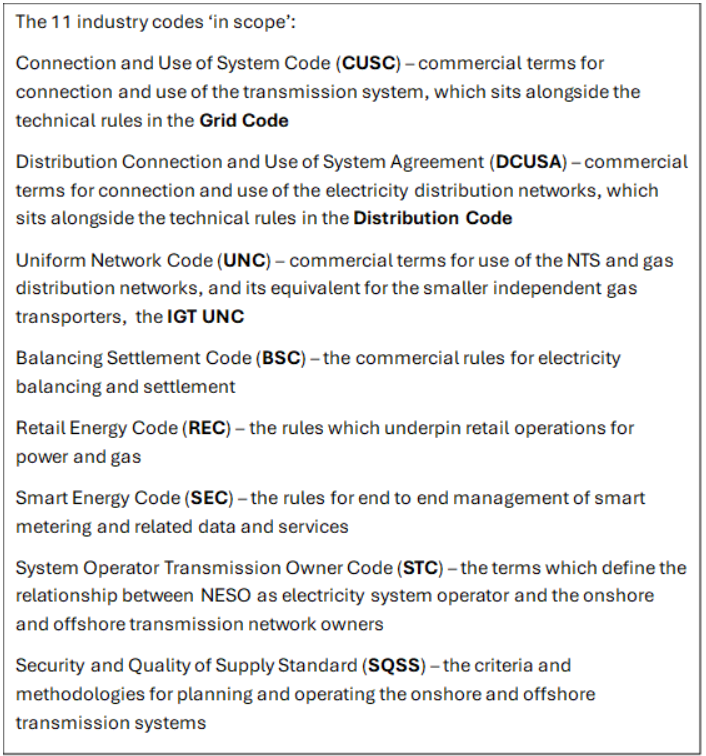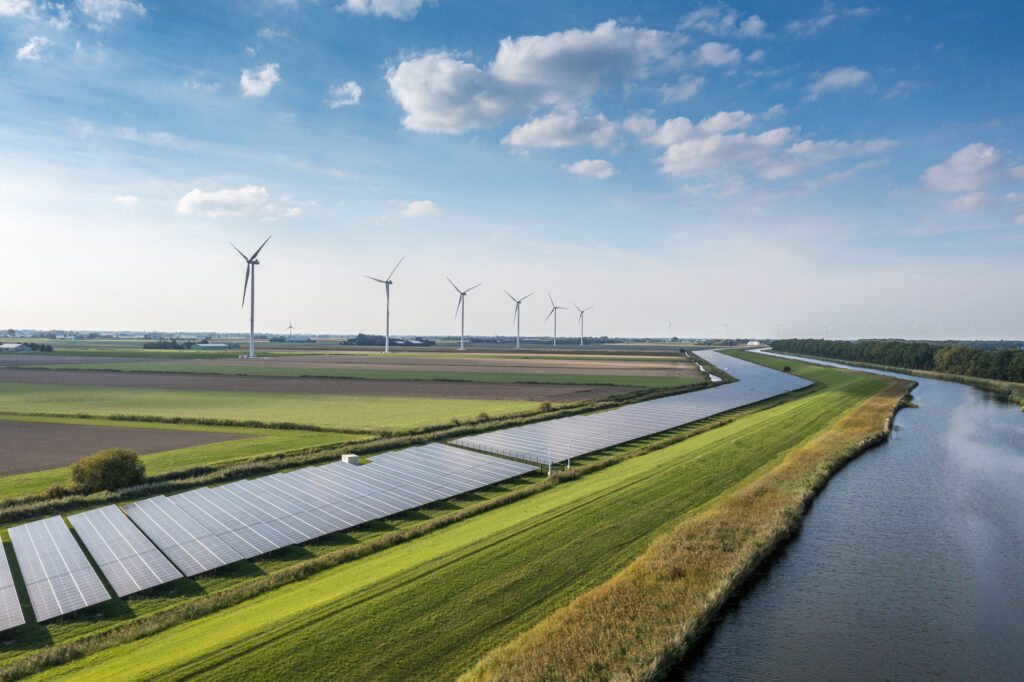Many of the developments we are now seeing in the energy sector – for example. hydrogen business models, the new independent system operator, impending regulation of the heat sector – derive from powers in the landmark Energy Act 2023. Among those new powers are transitional and enduring powers for Ofgem to facilitate a reform of the myriad of industry codes that underpin the workings of the GB power and gas regimes.

Perhaps a slightly drier topic than other matters covered in the act, but crucial, nonetheless. The main industry codes in scope for these purposes are shown below:
These codes are overseen by industry regulator Ofgem, and have evolved over time, some first put in place on or shortly after industry privatisation. But there is broad consensus that they are not compatible with a rapidly evolving energy system which is increasingly interconnected, both vertically (as regards transmission and distribution) and horizontally (across power and gas) – and which has many more (and smaller) participants and wider stakeholders.
This reform programme is being led by government (DESNZ) and Ofgem jointly, and will involve new secondary legislation and regulation to facilitate the selection and regulation of so-called ‘code managers’. These will play a key role, tasked with proactive management and evolution of the codes, in line with directions from Ofgem to be contained in an annual ‘Strategic Direction Statement’. There will also be new ‘Stakeholder Advisory Forums’, to guide and inform code managers in their decision-making.
Also central to the reform programme is a consolidation of the codes. This will be no mean feat, and will take some time. These codes can run to many hundreds of pages, contain complex commercial and technical rules, in some cases designed around a framework of participants and assets which have now changed beyond recognition. And some bear the hallmarks of clunky retrofitted updates resulting from the changes mandated pre-Brexit by the EU network codes and guidelines.
The changes, which are summarised below, have received broad support from industry, and there is an appetite now for Ofgem to move forward at pace.
Code managers – October decisions
Earlier this month (October 2024), DESNZ and Ofgem published government’s response to its consultation back in March 2024 on the proposed code manager licensing regime and related secondary legislation, that will allow Ofgem to make the changes to the codes needed for implementation, and to select the code managers.
The code manager role will be central to the reforms, responsible for driving forward code modifications in line with directions from Ofgem, and taking over the main functions of existing code administrators and code panels.
The main decisions are:
- Code manager activity will be not for profit, with cost recovery mechanisms to be established on a code-by-code basis, and no reliance on financial incentives or penalties to encourage efficiency;
- There will be rules to address conflicts of interest and ensure independence from industry stakeholders, including a requirement that boards have majority independent directors;
- In common with other licensed activities, there will be a package of financial and operational controls to ensure financial stability and operational capability of code managers, including prohibition on cross subsidies.
Funding is clearly going to be key; code managers will be taking on material responsibilities and working under new frameworks, which will be challenging and it will be crucial that they are properly funded.
As for selection of code managers, Ofgem will have discretion to decide whether to use a competitive route, but will need to conduct a conflict of interest assessment in all cases. It is expected that secondary legislation to establish the code manager selection regime will come into force by the end of the calendar year. A further consultation from Ofgem is expected this coming winter with further detail on how code manager selection (competitive and non-competitive) could take place, as well as on the content of its first Strategic Direction Statement which is expected to be published in spring next year.
Initial changes to codes, licences and contracts – August decisions
These latest decisions follow the publication in August 2024 of Ofgem’s decisions resulting from its consultation launched in January 2024 on its overall approach to using its extensive Energy Act powers to implement the code reforms.
Designation of codes and systems
These powers enable Ofgem to make the necessary changes to the relevant documents, but only in relation to ‘qualifying documents’ or ‘qualifying central systems’ designated for this purpose by government following a recommendation by Ofgem. This designation will formally take place once Ofgem has selected the code manager.
In its August decision document, Ofgem explained its decision to designate the 11 industry codes outlined above as qualifying documents. The SQSS currently sits outside the existing licence framework, and so there will need to be a modification to the National Energy System Operator (NESO)’s licence to bring that into scope.
As for the designated central systems, those which will become qualifying central systems are:
- The central system delivery functions undertaken by Xoserve which underpin the gas industry arrangements;
- The equivalent functions underpinning electricity balancing and settlement, undertaken by Elexon;
- The equivalent functions underpinning the rules and requirements for smart metering service delivery, currently operated by the Data Communications Company (DCC);
- The central switching service, governed by the REC, currently also operated by the DCC; and
- The central system delivery functions underpinning the Data Transfer Service (DTS), which carries data used in the change of supplier process (as required by the REC and BSC) which is operated by Electralink.
The logic in designating these systems is evident, as they are all integral to the code frameworks, and there is a clear need to ensure effective coordination between the new code managers and the delivery bodies to allow for code and system changes to develop in alignment.
Further detail is awaited in a future consultation on how Ofgem proposes to use its transitional powers to amend licences, codes and contracts so that it can facilitate its enduring powers under the act, including the power to issue directions to those operating these systems, and how cost incurred through complying with Ofgem directions can be recovered.
Code consolidation
As mentioned above, Ofgem’s transitional powers under the act were also designed to facilitate code consolidation. Further detail is given in the August 2024 document on how Ofgem envisages that this will take place. Its view is that the best way to do this is a two stage process; firstly to establish a single set of overarching contract terms sitting above the codes to be consolidated, and then subsequent rationalisation and harmonisation of the individual codes to reduce complexity and fragmentation. This second stage may take some time, and will be driven by the relevant code manager.
After examining various options, Ofgem has decided to:
- Create an ‘electricity commercial code’ through the consolidation of the CUSC and the DCUSA;
- Create an ‘electricity technical code’ through the consolidation of the Grid Code, SQSS, STC and Distribution Code, though it concedes that the inclusion of the STC requires further consideration given its commercial content; and
- Create a gas network code through the consolidation of the UNC and IGT UNC.
Ofgem does not presently intend to consolidate the BSC, REC or SEC.
There are a variety of pros and cons of proceeding in this way, with one challenge being the prospect of some incredibly chunky documents, which will be an effort to navigate. The UNC and IGT UNC is probably the most obvious case for consolidation, not least because the two codes are in many respects already harmonised and evolving in tandem. On the other hand, there is no obvious code manager with the requisite skills and experience at present who would be an obvious contender for the electricity commercial code.
Putting to one side the STS and SQSS which do not sit so easily alongside the other codes and where some have expressed concerns, the overall approach is sound, and aligns with the whole system view which now sits with the new NESO. The opportunity will hopefully be taken to harmonise the three consolidated codes in terms of structure and design, and digitised to maximise usability.
As always with any code change, the devil will be in the detail. It will be important to ensure that, in the period when no code manager will be appointed, Ofgem’s use of its transitional powers is limited in scope. Indeed, Ofgem has indicated that it intends to confine its focus during this Ofgem-led consolidation activity on:
- Common contractual framework
- Contract boilerplate and definitions
- Party accession and exit
- Code modification process
- Code objectives
- Code compliance
- Credit cover arrangements
- Dispute processes, and
- Derogation provisions.
This makes sense, and indeed anything which can deliver clearer and more aligned definitions and contract terms across the codes is to be welcomed.
It is expected that work will kick off on this consolidation process with Ofgem-led industry working groups at the beginning in 2025. Further detail including sequencing will follow in a future consultation.
Strategic Direction Statement
The act introduced a new obligation on Ofgem to publish an annual Strategic Direction Statement (SDS) for designated industry codes. This is intended to set the direction of travel for the development of the codes, in line with Ofgem’s overarching vision for the sector. The SDS is required by the act to contain a strategic assessment of government policy and developments which require modifications to the designated codes, and in preparing the SDS Ofgem must have regard to advice given by the NESO.
The first SDS will be published in spring 2025, before code managers are appointed, and will have a one to two year time horizon, covering all the codes in scope.
All licence holders, of all types, will have a new principles-based standard licence condition requiring the licence holder to cooperate in the development and delivery of code modification related to the SDS, when reasonably requested to do so by the code manager. A similar obligation will be placed in all codes when the relevant code manager is appointed, to capture non-licensed code parties. Concern has been expressed that this licence condition is too wide ranging and could expose licence holders to a potentially limitless obligation to respond to requests from the code manager. Ofgem has suggested that this could be addressed by the code containing detail on how and when a code manager could reasonably request cooperation.
Ofgem will consult in due course on its draft first SDS. The role of the SDS will be crucial in helping ensure that, as we march towards a decarbonised power sector by 2030 and, in due course, net zero by 2050, the energy industry can deliver in a coordinated and consistent manner. The SDS will obviously need to be aligned with developments elsewhere, notably the Strategic Spatial Energy Plan and the Review of Electricity Market Arrangements.
Stakeholder Advisory Forums
Part of the role of the new code managers will be to provide Ofgem with recommendations on proposed code modifications, in collaboration with industry stakeholders. The idea is that this will take place via new Stakeholder Advisory Forums (SAFs), with one for each code. After considering various options, Ofgem has decided that each SAF should be established with a fixed membership of stakeholders and independent parties acting impartially, plus a pool of additional members. This is similar to existing arrangements with some codes, and its mix of code parties under an obligation to act impartially, working alongside independent members and a pool of experts, is judged to give the best route to properly informed decision making by the code manager.
Code modification prioritisation
Ofgem has decided to take forward proposals to harmonise and extend the ability of code panels to prioritise the assessment of code modification proposals, and to introduce a consistent set of prioritisation criteria.
Transition
An important decision is how to implement these changes across the various codes, which could be a ‘big bang’ approach whereby the new governance arrangements are effective for all codes at the same time. Among other options, including starting the process for all codes at the same time but at different speeds, or starting sequentially one at a time, Ofgem’s preferred approach is to phase the transition. This is sensible, and will allow resource and workloads to be managed appropriately, and should allow for reduced complexity overall.
There will be three phases, with two codes in each phase:
Phase 1: BSC and REC
Phase 2: gas network code and electricity commercial code
Phase 3: electricity technical code and SEC.
As mentioned, there is a lot of detail to follow, and future consultations expected shortly, so things can be expected to move now at a sharper pace.
For more information on any of the issues outlined in this paper, please contact Andrew Whitehead or any other member of our energy team.






